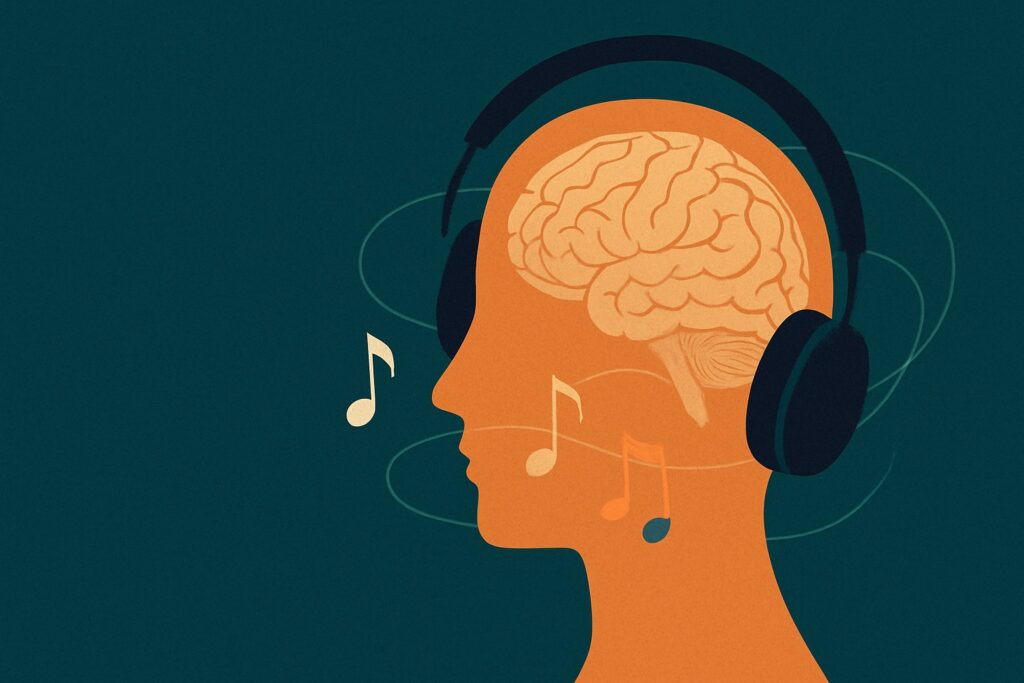How Music Changes the Brain: The Neuroscience of Productivity
In the depths of the human brain, among electric impulses and chemical reactions, music grows—like light through mist. It doesn’t just please the ear — it changes us. Not metaphorically, but literally, physiologically. Modern neuroscience proves: music can alter brain activity, improve concentration, reduce stress, and stimulate cognitive functions. That’s why it is becoming an increasingly important tool for productivity — at work, in study, and in daily life.
A Brain That Listens
When we listen to music, our brain lights up in several areas at once:
-
The auditory cortex processes sound;
-
The frontal cortex analyzes structure;
-
The hippocampus links music with memory and emotion;
-
Even the motor cortex gets activated — the brain “prepares” for rhythm even if we remain still.
This complex neural interplay creates a form of synchronization in brain network activity.
Music also stimulates the release of dopamine — the neurotransmitter of pleasure and motivation. That’s why a favorite track can boost your mood and enhance performance. In a state of pleasant arousal, we work faster, more creatively, and with less mental resistance.
Alpha Waves and the Flow State
One of the key mechanisms by which music affects concentration is the stimulation of alpha waves in the brain. These are slow rhythms (8–14 Hz) that appear in a state of light focus — when a person is neither fully relaxed nor tense. This “golden middle” is ideal for productivity.
Music in genres such as ambient, lo-fi, future garage, or wordless classical pieces can nudge the brain toward this wave activity. As a result, it becomes easier to enter the so-called flow state — when the sense of time fades away and the mind focuses solely on the task.
Music and Memory
The connection between music and memory has been studied for years — and the results are striking. Rhythm and melody help reinforce information, which is used in language learning, memorization of complex concepts, and even in therapies for people with dementia.
Studies show: students who listen to calm instrumental music while studying tend to remember material better. Music is especially effective during review sessions, as it creates an emotional backdrop that activates long-term memory.
Background Noise vs. Silence
Not all music is beneficial for concentration. Lyrics, aggressive rhythms, or frequent dynamic shifts can be distracting. But silence isn’t always better. For many, light background sound suppresses inner noise — the anxious thoughts that prevent focus.
Here, the concept of white noise and soundscapes comes into play: water, wind, slow-paced electronic textures. They mask irrelevant sounds and help the brain maintain focus. Even without traditional melody, such sound is a form of functional music.
Music as Ritual
Just as important is the element of habit. If a person regularly turns on a specific type of music before working or studying, the brain begins to associate it with entering a productive mode. It becomes a conditioned reflex, an auditory routine that triggers the right mental state.
Like coffee in the morning or a prayer before battle, music becomes the spark for the internal engine. It doesn’t merely accompany work — it tunes the person into it, shifting from chaos to order.
Stress, Fatigue, and Music Therapy
Music also helps fight stress and fatigue — the primary enemies of productivity. By influencing the parasympathetic nervous system, it reduces heart rate, regulates breathing, and lowers cortisol levels. This is especially valuable after long periods of strain, when the body is running at its limits.
Even informal music therapy — simply listening to favorite tracks with closed eyes — restores energy balance and gives the brain a moment of rest.
Practical Tips for Enhancing Productivity
-
Choose instrumental music without lyrics — so it doesn’t compete with internal speech.
-
Avoid chaotic dynamics — the best music for focus has a stable tempo (60–80 bpm).
-
Create a ritual — play music at the start of work to form a productive habit.
-
Experiment with genres — try ambient, future garage, minimalist classical, lo-fi hip-hop.
-
Use quality headphones — to fully immerse in the sonic environment.
Final Note
Music is not just a pleasant background to everyday tasks. It is a tool for influencing the very essence of our attention, memory, and work capacity. Like an invisible conductor, it guides our thoughts, calms chaos, and leads us through the noise of the information age.
It carries the ancient rhythm of life — and perhaps in it lies the deepest source of our productivity.
So next time you sit down to work — turn on the right music.
And listen.
Because maybe, just maybe, it speaks to you with the voice of your best self.

